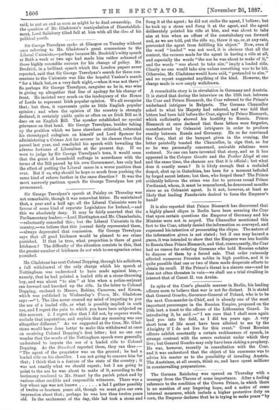Sir George Trevelyan spoke at Glasgow on Tuesday without once
referring to Mr. Gladstone's great concessions to the Liberal Unionists,—perhaps because Mr. Brodrick's witty speech at Bath a week or two ago had made him rather ashamed of those highly recondite excuses for his change of policy. Mr. Brodrick, in a brilliant speech which the London papers never reported, said that Sir George Trevelyan's search for these con- cessions to the Unionists was like the hopeful Yankee's search "for a black hat, on a very dark night,—when it was not there." So perhaps Sir George Trevelyan, sanguine as he is, was wise in giving np altogether that line of apology for his change of front. He insisted very much on the inadequacy of the House of Lords to represent Irish popular opinion. We all recognise that ; but then, it represents quite as little English popular opinion ; and when the opinion of the country is strongly declared, it certainly yields quite as often on an Irish Bill as it does on an English Bill. The speaker established no special grievance on that head. Sir George Trevelyan, besides taking up the position which we have elsewhere criticised, reiterated his stereotyped enlogium on himself and Lord Spencer for administering a Crimes Act far severer in its clauses than that passed last year, and concluded his speech with bewailing the adverse fortunes of Liberalism at the present day. If we were to judge by Sir George Trevelyan's tone, it would seem that the grant of household suffrage in accordance with the terms of the Bill passed by his own Government, has only had the effect of putting the Liberal cause in a worse position than ever. But if so, why should he hope so mach from pushing the same kind of reform further in the same direction ? It was the most narrowly partisan speech Sir George Trevelyan has yet pronounced.










































 Previous page
Previous page